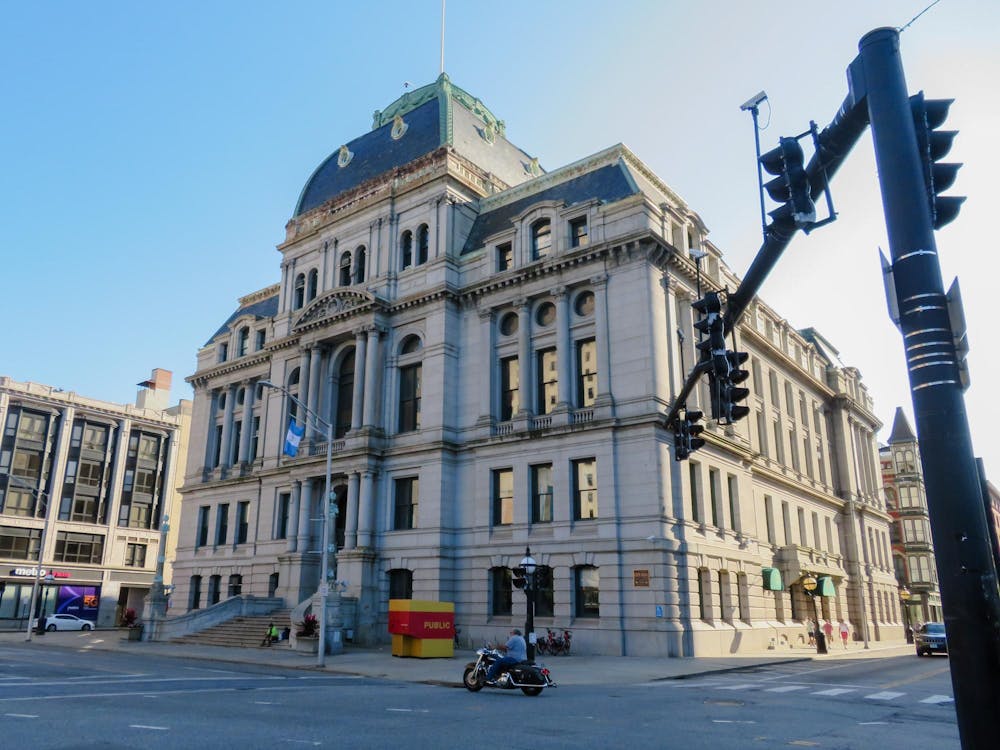Approximately 100 community members gathered this Saturday to provide input on how the Providence Public School District can improve in hopes of transitioning back from state to local control.
The Rhode Island Department of Education has taken over the district for the past five years and recently decided to continue the takeover for three more years, despite local objections. At Saturday’s meeting, Providence Mayor Brett Smiley said that he took RIDE’s decision as a challenge to demonstrate “to RIDE and the K-12 board that we’re prepared because we want our schools back.”
Smiley introduced the meeting as a space to gather feedback and advice to help PPSD make progress on the Turnaround Action Plan — the city’s guide to creating a model school district.
Community members entering the event responded to prompts written on sheets of paper hung on Providence Career and Technical Academy’s lobby walls. Participants referenced concerns that little to nothing had changed since RIDE first took over the district. Others wrote that they were worried a return to local control would mean less accountability for PPSD leaders.
Concerns about RIDE’s management of PPSD were mirrored in a summary of survey results shared in remarks by Providence Director of Recreation Stephen Grace. The “return to local control survey,” which has received over 500 responses so far, found that a majority of respondents believed that the district had been “moving in the wrong direction” since the takeover began and wanted to see an immediate return to local control.
City officials started taking steps in anticipation of the transition, forming a Return to Local Control Cabinet with collaboration between the mayor, the city council and the school board. Many members of the city council, school board, PPSD, city leadership and RIDE were present at Saturday’s meeting.
Councilman John Goncalves (D-Ward 1) said in an interview with The Herald that it will be important for the plan and timeline of the transition to be community-driven. “We really have to meet people where they are,” he said.
Carol Pagan ’99 MAT ’00, a teacher at PPSD’s Leviton Dual Language School, expressed concern that the takeover has led to an increase in testing. She shared that this has been especially challenging because multilingual students are required to take their assessments in both their native languages and English. “If we’re over-assessing, where’s the time for instruction?” she said.
Pagan said she hopes that plans for a transition back to local control will put the needs of “language learners more at the forefront.”
After the opening remarks, participants were invited to discuss four focus areas in breakout groups — attendance and graduation, family and caregiver engagement, school quality and test scores. A fifth breakout group for Spanish speakers discussed all four topics.
Members of the school quality group expressed a lack of understanding about how school quality was assessed, and many described RIDE’s star-rating system as confusing. Participants also voiced concerns about teacher and leadership turnover, inadequate support for students with special needs and a disconnect between decision-makers and stakeholders. Some suggested district leaders spend more time visiting schools to better understand the day-to-day experience of PPSD teachers and students.
Dozens of attendees were wearing “Stop the Wait RI” shirts in support of an organization that advocates for charter school availability.
Although Stop the Wait RI focuses on charter schools, founder and CEO Seguí Rodríguez said many charter school families still have students in PPSD. She said she thought the city could have done more to advertise the event, noting that “in the Spanish room, I think there were 4 parents outside of (Stop the Wait RI-affiliated) parents.”
Andrea Gonzalez Sanchez, interim program manager with Young Voices RI, noted that students need to be more included in conversations about the future of the district. “Student voice is necessary,” she said, adding that organizers need to ensure “that young people are here speaking up for themselves.”
The city promoted the event through social media, the city’s website and newsletters and the PVD 311 system, Providence Deputy Press Secretary Samara Pinto wrote in an email to The Herald. Event details were also shared at community events and displayed on flyers that were distributed throughout the city.
Gonzalez Sanchez and Seguí Rodríguez both said they felt the meeting was short. “Some conversations should have been longer,” Gonzalez Sanchez said. She also suggested that participants should have had a way to share contact information to keep “fighting for a shared cause.”
“We're not reaching everybody,” Grace acknowledged. “Those of you in this room should feel empowered to host your own community conversations.”
A second community conversation on education will be hosted by the mayor on Dec. 14.

Ciara Meyer is a section editor from Saratoga Springs, New York. She plans on concentrating in Statistics and English Nonfiction. In her free time, she loves scrapbooking and building lego flowers.





